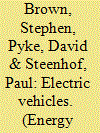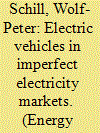|
|
|
Sort Order |
|
|
|
Items / Page
|
|
|
|
|
|
|
| Srl | Item |
| 1 |
ID:
096746


|
|
|
|
|
| Publication |
2010.
|
| Summary/Abstract |
After nearly a century with the internal combustion engine dominating the personal transportation sector, it now appears that the electric vehicle is on the verge of experiencing rapid growth in both developed and developing vehicle markets. The broad-scale adoption of the electric vehicle could bring significant changes for society in terms of not only the technologies we use for personal transportation, but also moving our economies away from petroleum and lessoning the environmental footprint of transportation. This article investigates the role of standards, related training and certification for the electric vehicle. It is argued that the potential for the electric vehicle will be stunted without adequate attention being paid to standards, not only in terms of the speed of its uptake and smoothness of this transition, but also in terms of maintaining compatibility between jurisdictions, safety of the public, and helping to ensure environmental sustainability. We highlight a number of areas where new or adaptations of current standards, training and certification may be needed, notably in terms of batteries and charging infrastructures, electricity distribution and accounting for the environmental characteristics of this electricity, and different aspects of vehicle-to-grid and smart grid technologies.
|
|
|
|
|
|
|
|
|
|
|
|
|
|
|
|
| 2 |
ID:
109650


|
|
|
|
|
| Publication |
2011.
|
| Summary/Abstract |
We use a game-theoretic model to analyze the impacts of a hypothetical fleet of plug-in electric vehicles on the imperfectly competitive German electricity market. Electric vehicles bring both additional demand and additional storage capacity to the market. We determine the effects on prices, welfare, and electricity generation for various cases with different players in charge of vehicle operations. Vehicle loading increases generator profits, but decreases consumer surplus in the power market. If excess vehicle batteries can be used for storage, welfare results are reversed: generating firms suffer from the price-smoothing effect of additional storage, whereas power consumers benefit despite increasing overall demand. Strategic players tend to under-utilize the storage capacity of the vehicle fleet, which may have negative welfare implications. In contrast, we find a market power-mitigating effect of electric vehicle recharging on oligopolistic generators. Overall, electric vehicles are unlikely to be a relevant source of market power in Germany in the foreseeable future.
|
|
|
|
|
|
|
|
|
|
|
|
|
|
|
|
| 3 |
ID:
111404


|
|
|
|
|
| Publication |
2012.
|
| Summary/Abstract |
Although the electric vehicle reduces pollutant emissions and results in reduced energy costs, lack of battery charging infrastructure and relatively high vehicle prices create challenges to the automobile industry and affect government support policies. To create a battery charging infrastructure, such as a vehicle-to-grid system, stakeholders need a quantitative analysis that decreases profitability uncertainty. The high cost of an electric vehicle can be offset by government subsidies that promote early marketing efforts, but an ex-ante evaluation of consumer demand is needed to analyze the effectiveness of any policy. This study provides information about optimal pricing based on consumer demand as well as the social welfare change effected by possible government subsidy polices for electric vehicles. Results show that the maximum profit for a vehicle-to-grid service provider will be 1.27 trillion Korean won/year with an annual subscription fee of 0.65 million Korean won. The government subsidy of 1 trillion Korean won, given annually, will increase social welfare by 1.94 trillion won and also boost the profit of vehicle-to-grid service provider to 1.98 trillion won.
|
|
|
|
|
|
|
|
|
|
|
|
|
|
|
|
| 4 |
ID:
115138


|
|
|
|
|
| Publication |
2012.
|
| Summary/Abstract |
The idea that electric vehicles can be used to supply power to the grid for stabilisation and peak time supply is compelling, especially in regions where traditional forms of storage, back up or peaking supply are unavailable or expensive. A number of variants of the vehicle-to-grid theme have been proposed and prototypes have proven that the technological means to deliver many of these are available. This study reviews the most popular variants and investigates their viability using Western Australia, the smallest wholesale electricity market in the world, as an extreme test case. Geographical and electrical isolation prevents the trade of energy and ancillary services with neighbouring regions and the flat landscape prohibits hydroelectric storage. Hot summers and the widespread use of air-conditioning means that peak energy demand is a growing issue, and the ongoing addition to already underutilised generation and transmission capacity is unsustainable. The report concludes that most variants of vehicle-to-grid currently require too much additional infrastructure investment, carry significant risk and are currently too costly to implement in the light of alternative options. Charging electric vehicles can, however, be added to planned demand side management schemes without the need for additional capital investment.
|
|
|
|
|
|
|
|
|
|
|
|
|
|
|
|
|
|
|
|
|